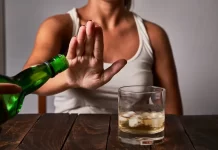Anxiety is a feeling of unease, such as worry or fear, that can be mild or severe. It is a normal stress reaction, but for some people, it can be so severe that it interferes with daily life. Substance abuse is the use of drugs or alcohol to cope with problems or emotions. When someone has both anxiety and substance abuse, it is called a dual diagnosis.
Dual diagnosis can be difficult to treat because both conditions need to be addressed. But with proper treatment, many people can overcome dual diagnosis and lead healthy lives.
Read on for more information regarding substance abuse and anxiety treatment!
Table of Contents
How Does Substance Abuse Lead To Anxiety
Substance abuse can often lead to anxiety, as it can disrupt the normal balance of neurotransmitters in the brain.
This disruption can trigger feelings of worry and unease and cause hypervigilance or increased alertness to perceived threats. Substance abuse also interferes with sleep quality and mood, which can exacerbate symptoms of anxiety and negatively impact cognitive functions such as concentration, memory, and decision-making.
Furthermore, withdrawal from addictive substances can provoke feelings of panic that interfere with the judgment and make individuals more likely to engage in high-risk behaviors.
In sum, several factors contribute to substance-induced anxiety, making it a serious concern for those who struggle with addiction. Ultimately, addressing these underlying issues is crucial for effective recovery from substance abuse.
What Are The Different Types of Anxiety Disorders
Anxiety disorders are the most common mental health disorders in the United States, affecting 40 million adults over the age of 18.
There are several different types of anxiety disorders, each with its own set of symptoms. The most common types of anxiety disorders include:
Generalized Anxiety Disorder (GAD)
People with GAD experience chronic and excessive worry about a variety of topics, such as their health, finances, work, or family. They may have difficulty concentrating or sleeping and often feel irritable or on edge.
Obsessive-Compulsive Disorder (OCD)
People with OCD have intrusive, unwanted thoughts (obsessions) that cause them anxiety. To relieve this anxiety, they feel the need to perform certain rituals or routines (compulsions).
Phobias
A phobia is an intense fear of a specific object or situation. People with phobias may go to great lengths to avoid their triggers and may experience panic attacks when they are exposed to them.
Post-Traumatic Stress Disorder (PTSD)
PTSD is a condition that can develop after exposure to a traumatic event, such as a car accident, sexual assault, or natural disaster. People with PTSD may experience flashbacks, nightmares, and intrusive thoughts about the traumatic event. They may also feel constantly on edge and have difficulty sleeping or concentrating.
Social Anxiety Disorder (SAD)
People with SAD experience intense fear and anxiety in social situations. They may worry about being judged or embarrassed and may avoid social activities as a result.
Anxiety disorders can be debilitating and interfere with everyday life. But with proper treatment, many people with anxiety disorders can lead healthy, productive lives.
How To Get Help For Substance Abuse and Anxiety
If you or someone you know is struggling with a substance abuse problem or experiencing symptoms of anxiety, it’s important to seek help as soon as possible.
There are many resources available that can provide support and guidance for those who are battling addiction or dealing with mental health concerns.
For example, you may want to consider contacting a local treatment center or mental health professional. These professionals have extensive training in substance abuse and anxiety disorders, and they can offer personalized guidance and support tailored to your individual needs and physical symptoms.
Additionally, there are several peer support groups, self-help books, and online resources that can help people to cope more effectively with their issues and build better lives free from the hold of addiction or debilitating anxiety.
No matter what type of help you or your loved ones need, there is almost certainly an option out there that can make all the difference in the world. So if you’re ready to break free from substance abuse or anxiety and start living your best life, don’t hesitate to reach out for the support that you deserve.
Helpful Strategies That Can Be Employed To Gain Control of Substance Abuse and Anxiety

When dealing with substance abuse and anxiety, several helpful strategies can be employed to gain control of these issues.
- One approach is to get into a regular exercise routine in which you engage in regular physical activity. Not only will this help to boost your mood, but it can also help you to better manage cravings for addictive substances.
- Additionally, using relaxation techniques such as deep breathing exercises or visualization can help to reduce feelings of anxiety and stress.
- Finally, building a strong support network through therapy or counseling sessions can allow you to get the emotional support and guidance that you need to overcome your challenges with substance abuse, panic disorder and other anxiety disorders.
With the right tools and commitment, it is possible to take back control of your chronic anxiety or major depression issues and lead a healthy, fulfilled life.
Treatment For Anxiety Disorders
There are many effective treatments for anxiety disorders. The most common treatment options include:
Cognitive-Behavioral Therapy (CBT)
CBT is a type of therapy that helps people to identify and change negative thinking patterns and behaviors that contribute to anxiety and mental disorders.
Exposure Therapy
Exposure therapy is a type of CBT that involves gradually exposing a person to their fear in a safe and controlled environment. This can help them to overcome their fear and treat anxiety.
Medication
Several types of medication can be effective for treating anxiety disorders, including antidepressants, anti-anxiety medications, and beta-blockers.
Support Groups
Support groups provide a safe and supportive environment for people to share their experiences and connect with others who are dealing with alcohol abuse, anxiety, and similar issues.
Anxiety disorders can be debilitating, but there is hope. With the right treatment, many people can manage their symptoms and live relatively normal lives.
Conclusion
Substance abuse and anxiety go hand in hand, as people who are struggling with addiction and major depressive disorder often experience intense feelings of stress, worry, and fear. While these issues can be incredibly challenging to deal with on their own, they can have even more severe effects when combined.
Ultimately, anyone who is struggling with substance abuse or anxiety symptoms should seek help as soon as possible to begin the recovery process and regain control of their lives. With support from loved ones and professional treatment programs, it is possible to overcome both addiction and anxiety and lead a healthier, happier life.
















